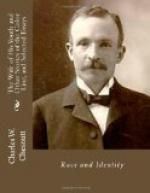He did not leave the office, but hung around awhile as though there were something further he wished to speak about. Finally, after some discursive remarks about the crops and politics, he asked, in an offhand, disinterested manner, as though the thought had just occurred to him:——
“Mistah Wright, w’ile’s we ‘re talkin’ ’bout law matters, what do it cos’ ter git a defoce?”
“That depends upon circumstances. It is n’t altogether a matter of expense. Have you and aunt Milly been having trouble?”
“Oh no, suh; I was jes’ a-wond’rin’.”
“You see,” continued the lawyer, who was fond of talking, and had nothing else to do for the moment, “a divorce is not an easy thing to get in this State under any circumstances. It used to be the law that divorce could be granted only by special act of the legislature; and it is but recently that the subject has been relegated to the jurisdiction of the courts.”
Uncle Wellington understood a part of this, but the answer had not been exactly to the point in his mind.
“S’pos’n’, den, jes’ fer de argyment, me an’ my ole ’oman sh’d fall out en wanter separate, how could I git a defoce?”
“That would depend on what you quarreled about. It ’s pretty hard work to answer general questions in a particular way. If you merely wished to separate, it would n’t be necessary to get a divorce; but if you should want to marry again, you would have to be divorced, or else you would be guilty of bigamy, and could be sent to the penitentiary. But, by the way, uncle Wellington, when were you married?”
“I got married ‘fo’ de wah, when I was livin’ down on Rockfish Creek.”
“When you were in slavery?”
“Yas, suh.”
“Did you have your marriage registered after the surrender?”
“No, suh; never knowed nuffin’ ’bout dat.”
After the war, in North Carolina and other States, the freed people who had sustained to each other the relation of husband and wife as it existed among slaves, were required by law to register their consent to continue in the marriage relation. By this simple expedient their former marriages of convenience received the sanction of law, and their children the seal of legitimacy. In many cases, however, where the parties lived in districts remote from the larger towns, the ceremony was neglected, or never heard of by the freedmen.
“Well,” said the lawyer, “if that is the case, and you and aunt Milly should disagree, it would n’t be necessary for you to get a divorce, even if you should want to marry again. You were never legally married.”
“So Milly ain’t my lawful wife, den?”
“She may be your wife in one sense of the word, but not in such a sense as to render you liable to punishment for bigamy if you should marry another woman. But I hope you will never want to do anything of the kind, for you have a very good wife now.”
Uncle Wellington went away thoughtfully, but with a feeling of unaccustomed lightness and freedom. He had not felt so free since the memorable day when he had first heard of the Emancipation Proclamation. On leaving the lawyer’s office, he called at the workshop of one of his friends, Peter Williams, a shoemaker by trade, who had a brother living in Ohio.




